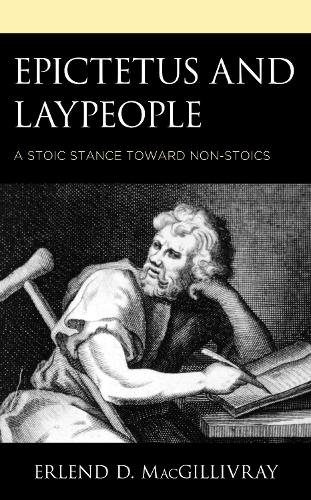
Epictetus and Laypeople: A Stoic Stance toward Non-Stoics
(Paperback)
Publishing Details
Epictetus and Laypeople: A Stoic Stance toward Non-Stoics
By (Author) Erlend D. MacGillivray
Bloomsbury Publishing PLC
Lexington Books
20th December 2021
United States
Classifications
Professional and Scholarly
Non Fiction
Ancient history
European history
188
Physical Properties
Paperback
238
Width 154mm, Height 219mm, Spine 18mm
363g
Description
Erlend D. MacGillivrays Epictetus and Laypeople: A Stoic Stance toward the Rest of Humanity explores the understanding that ancient philosophers had towards the vast majority of people at the time, those who had no philosophical knowledge or adherencelaypeople. After exploring how philosophical identity was established in antiquity, this book examines the Stoic philosopher Epictetus, who reflected upon laypeople with remarkable frequency. MacGillivray shows that Epictetus maintained his stance that a small and distinguishable group of philosophically aware individuals existed, alongside his conviction that most of humanity can be inclined to act in accordance with virtuous principles by their dependence upon preconceptions, civic law, popular religion, exempla, and the adoption of primitive conditions, among other means. This book also highlights other Stoics and their commentators to show that the means of lay reform that MacGillivray explores were not just implicitly understood in antiquity, but reveal a well-developed system of thought in the school which has, until now, evaded the notice of modern scholars.
Reviews
MacGillivray (independent scholar) explores these two questions in Epictetus. What distinguishes the philosopher from the non-philosopher How can the non-philosopher illuminate the philosopher's views The first part of the book treats the first question. Philosophers are people who can articulate their school's ideas and who live in accord with the philosophy's ethical demands. Laypeople, on the other hand, are subject to vices. Philosophers should, in general, avoid public engagement with laypeople. These conclusions set up the rest of the book, which investigates the second question. Here the layperson takes a more positive role, whether as virtuous early humans or as moderns supported by moral preconceptions, law, popular religion, and exempla. This book helps illuminate Epictetus's distinctive interest in discussing ordinary people, instead of hypothetical descriptions of the perfect, and impossible, Stoic sage. It likewise contributes to a greater understanding of Stoic philosophy's disinterest in venerating their founders and their willingness to find instruction in ideas and activities of those outside their school. . . the book is accessible to non-specialist audiences, as translations accompany Latin and Greek. Summing Up: Recommended. Upper-division undergraduates through faculty.
* Choice *"Epictetus is an excellent choice for studying an ancient philosophers attitudes toward non-philosophers. In this learned, wide-ranging, and well-conceived monograph, MacGillivray provides a probing account of this Stoics frustrations with laypersons, his advice to students to be cautious around them, his various pedagogical appeals to paragons, and his hopes for ethical progress despite the ineradicable flaws we all share. This work fills a real gap in scholarship on Epictetus." -- William O. Stephens, Creighton University
"MacGillivray captures Epictetuss double-mindedness about non-philosophers with scholarly discipline and principled clarity. This book is rich with detail and is a useful lesson in how philosophers must manage the broader non-(and even anti-) philosophical culture in which they must live. " -- Scott Aikin, Vanderbilt University
"This new study on Epictetus is a must read for anyone intrigued by the influential practical philosophy of this ancient Roman sage."
-- Massimo Pigliucci PhD, author of How to Be Stoic: Using Ancient Philosophy to Live a Modern LifeAuthor Bio
Erlend D. MacGillivray received his PhD from the University of Aberdeen, Scotland, in 2018.
